2014年秋人教版八年级英语上册Unit2单元教案
【人教版】八年级英语上册 Unit 2 全单元英文教案

Unit 2 How often do you exercise?Language Goal 【语言目标】Talk about how often you do things:in this unit,students learn to talk about what things they do and how often they do these things.Knowledge Goals 【知识目标】Key Wordshousework,hardly,ever,once twice,full,maybe,least,junk,coffee,health,percent,online,although,through,mind,body,such,together,die,writer,dentist,magazine,however,than,almost,less,pointKey Phraseshow often,on weekends,go to the movies,hardlyever,twice a week,three times a week,be goodfor,at least,such as,less than,more than Key Sentences1. How often do you exercise?2.What do you usually do on weekends?Key Grammar1. The use of adverbs of frequency.2.“How often” cause of special questions andanswers.Ability Goals 【能力目标】1. Through the learning to gain the ability to talk about how often people do things.2.Write a report about how often people do things.Moral Goals 【情感目标】1. Keep a diary every day.2.Do more exercise and develop good habits to keep healthy.Teaching Time 【课时】Five periodsPeriod 1 Section A(1a-2d)Period 2 Section A(Grammar Focus-3c)Period 3 Section B(1a-1e)Period 4 Section B (2a-2e)Period 5 Section B (3a-Self Check)本单元的教学内容围绕“多久做一次运动”这一话题展开。
人教版八年级英语上unit2sectionA1a2d教学设计教案

3.引入频率副词的概念,让学生观察并猜测这些词汇在生活中的出现频率,如“always”, “often”, “sometimes”, “rarely”, “never”,为新知的呈现做好铺垫。
-利用问题导向教学法,引导学生提出问题,激发学生的探究欲望,培养他们的自主学习能力。
-结合差异化教学策略,关注学生的个体差异,为不同水平的学生提供适当的学习任务和指导。
-运用形成性评价,及时了解学生的学习进度和困难,调整教学方法和节奏。
3.教学评价:
-通过课堂观察,评价学生在听力、口语、语法等方面的掌握程度。
2.利用多媒体教学资源,创设真实语境,让学生在实际语境中感知、体验、实践英语。
3.设计丰富的课堂活动,如小组讨论、角色扮演、听力练习等,激发学生的学习兴趣,提高学生的英语听说能力。
4.引导学生通过自主学习和合作学习,培养良好的学习策略和团队协作能力。
5.教师在课堂上及时给予学生反馈和指导,帮助学生发现和纠正错误,提高学习效果。
人教版八年级英语上unit2sectionA1a2d教学设计教案
一、教学目标
(一)知识与技能
1.掌握本节课的核心词汇和短语,如"frequency", "usually", "often", "sometimes", "rarely", "never",并能在实际语境中正确运用。
2.能够理解和运用一般现在时的陈述句、一般疑问句及其回答,如"Do you often...?", "Yes, I do./ No, I don't.",描述日常活动和习惯。
人教版英语八年级上册教案:Unit2-SectionB(2a-2e)
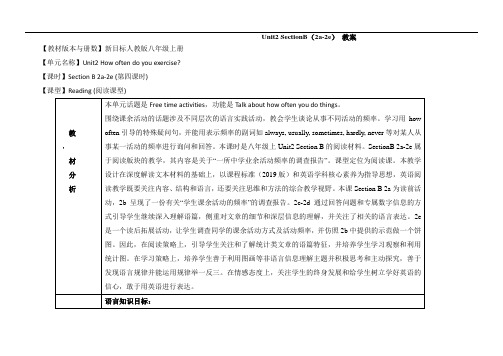
Unit2 SectionB(2a-2e)教案【教材版本与册数】新目标人教版八年级上册【单元名称】Unit2 How often do you exercise?【课时】Section B 2a-2e (第四课时)【课型】Reading (阅读课型)2获取新知识.,{Step 3While-reading…,-—Careful- reading1. T: T asks Ss to read Para. 1 and find out the 3activities from it.Ss: Ss think it over about “What questions did the writerask?”.>2. Finish 2bT: T guides Ss to scan Para. 2 and complete the first pie.Then read Para.3 or 4, complete the pie and exchangethe information.S: Ss read the three paragraphs and finish the pie.(3.T: T asks Ss to look at the pie, and answer thequestions.Ss: Ss try to look at the pie and the article to answer thequestions.What percent of the students do not exercise at all?/训练学生阅读获取具体信息和提问能力,为后面的阅读教学活动做铺垫。
…训练学生理解并解释图表提供的信息,将文本的语言知识有效的挂靠到文本结构下的学习。
让学生学习观察和利用统计图,培养科研探究素养中必备的数据分析能力。
:通过分段细读Para. 1,学生是否能找出调查话题和调查内容。
人教版八年级英语上册教材Unit2 教案
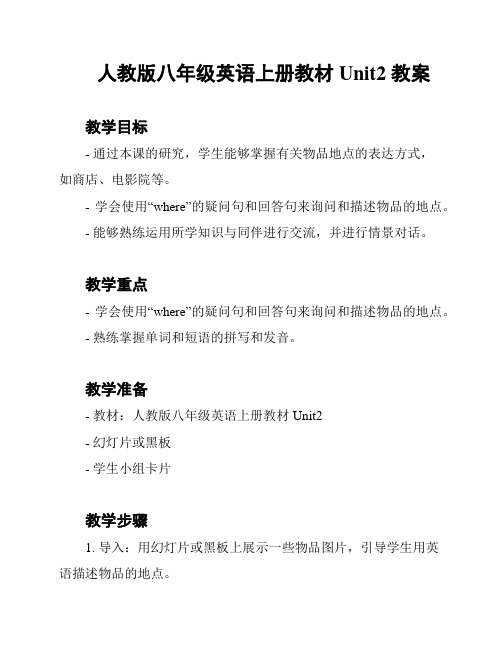
人教版八年级英语上册教材Unit2 教案
教学目标
- 通过本课的研究,学生能够掌握有关物品地点的表达方式,
如商店、电影院等。
- 学会使用“where”的疑问句和回答句来询问和描述物品的地点。
- 能够熟练运用所学知识与同伴进行交流,并进行情景对话。
教学重点
- 学会使用“where”的疑问句和回答句来询问和描述物品的地点。
- 熟练掌握单词和短语的拼写和发音。
教学准备
- 教材:人教版八年级英语上册教材Unit2
- 幻灯片或黑板
- 学生小组卡片
教学步骤
1. 导入:用幻灯片或黑板上展示一些物品图片,引导学生用英
语描述物品的地点。
2. 研究新知:通过教材Unit2的相关内容,教授目标词汇和短语,让学生理解并记忆。
3. 练活动:进行对话练,学生分组,每个小组选择一个物品进行情景对话,询问和回答物品的地点。
4. 拓展活动:让学生运用所学知识,创造自己的对话,交流物品的地点。
5. 归纳总结:让学生回顾所学知识,进行总结归纳。
6. 作业布置:布置课后作业,要求学生练复述本课内容,并使用疑问句和回答句描述物品地点。
教学评价
- 通过学生的课堂表现、练活动和讨论活动来进行评价,检查学生是否能够正确运用所学语言进行物品地点的描述。
- 提供及时的反馈,鼓励学生用英语进行交流。
注意事项
- 确保课堂秩序,引导学生积极参与。
- 注重学生的口语能力培养,鼓励他们进行对话练。
- 提供足够的练机会,让学生熟练掌握所学知识。
以上为人教版八年级英语上册教材Unit2的教案,根据课堂实际情况适当调整教学步骤。
初中英语人教版八年级上册Unit2Section A(1a-2d)教学设计

Unit 2How often do you exercise?第一课时Section A(1a-2d)Teaching Goals【教学目标】Key words:housework,hardly,ever,once,twice,Internet,program,full,swingKey phrases:how often,on weekends,go to the movies,help with housework,hardly ever,go shopping,once/twice a week/a month,swing danceKey sentences:1.What do you usually do on weekends?I often go to the movies.2.How often do you watch TV?I watch TV every day.Teaching Key Points【教学重点】The vocabulary:housework,hardly,ever,once,twice,how often,on weekends,go to the movies,go shopping,help with housework,once/twice/three times a week/a month Target language:What do you usually do on weekends?I often go to the movies. Does he go shopping?No,he never goes shopping. How often do you have piano lessons?Twice a week,on Wednesday and Friday.Teaching Difficult Points【教学难点】1.The adverbs of frequency:always,usually,often,sometimes,hardly ever,never2.Target language above.Teaching Aids【教学工具】An English textbook,a tape recorder,CAI or courseware.Teaching Steps【教学过程】★Step 1Leading in1.Greetings:Talk about something the students did on summer vacation.2.Check the homework.★Step 2Pre-taskPage 9,1a.1.Look at the picture.2.Name each activity.T:What are they doing?S:They are shopping/reading/exercising/watching TV/helping with housework. (Help the students to answer.)3.Write the activities on the line.4.Check the answers on the board.5.Practice reading.Page 9,1c.1.Focus on the conversation in the box.2.Practice reading.3.Pair-work:What do you do on weekends?I...4.Group-work:Divide the class into groups of four or five. Make conversations. First S1 to S2:S1:What do you do on weekends?S2:I...S1:What does she/he do on weekends?S2:She/He...5.Act out their own dialogues.★Step 3While-taskPage 9,1b.1.Look at each picture above 1a.Tell what the person does on weekends. Check the Ss orally.2.Make sure what they will hear and do.3.Read these adverbs and explain.4.Play the tape twice. Write the letters on the line.Page 10,2a & 2b.1.Read the activities and the answers of “how often” first.2.Practice reading.3.In 2a we should know the activities you hear. In 2b we should know the answers of how often he does the activities.4.Play the tape for the first time. Ss only listen.5.Play the tape a second time. Ss do 2a.6.Play the tape a third time. Check the answers.7.Play the tape. Ss do 2b.8.Check the answers.In this part,we should pay attention to “how often” cause of special questions and answers.★Step 4Post-taskPage 10,2c & 2d.1.Focus on the conversation in 2c first.2.Practice reading.3.Read the activities in the left box.4.Fill in the chart.5.Pair-work:Make conversations.6.Make students scan the conversation in 2d.7.Teach and then make Ss role-play the conversation in pairs. In this part,student A will be Jack. Student B will be Claire. As they talk,move around to monitor their work. Offer language or pronunciation support as needed.8.Have a group of students present their conversation to the class.★Step 5Homework1.Practice the conversation in 2d.2.Do the exercises on Page 8 in students' book.Board Design板书设计Unit 2How often do you exercise?The first period Section A(1a-2d)1.Key vocabulary:housework,once,twice,full,how often,on weekends,go to the movies,help with housework,hardly ever,once a week,three times a month 2.表示动作的频率由高到低依次是always(100%),usually(80%),often(30%~50%),sometimes(20%),hardly ever(5%),never(0%)。
人教版小学英语八年级上册Unit2Section B(3a-Self Check)教学教案及教学反思
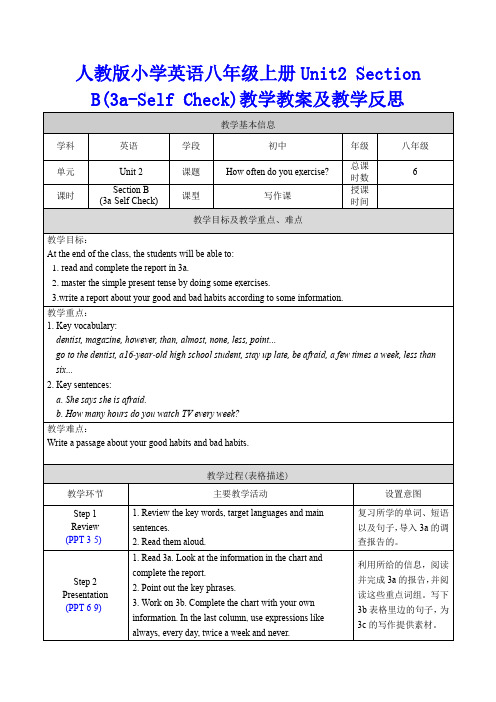
教学基本信息
学科 单元 课时
英语
Unit 2 Section B (3a-Self Check)
学段
初中
课题
How often do you exercise?
课型ห้องสมุดไป่ตู้
写作课
教学目标及教学重点、难点
年级
Practice the language points and the grammar of Unit 2.
How healthy are you? Write about your own habits.
完成第 1、2、3 题,熟 练运用频率副词。
通过单选、连词成句、 选词填空、选词填空和 汉译英等形式练习所 学的知识点。 今天的作业是写一篇 自己习惯的文章,练习 3a 和 3c 的作文形式。
Step 6 Self Check (PPT 20-22)
Step 7 Exercises (PPT 23-33)
Step 8 Homework (PPT 34)
1. Write some sentences about the good habits and and bad habits in 3b. 2.Work on 3c. Write a report about your good and bad habits. Say how often you do things. Use the report in 3a as an example. 3.Show one of the good passages to other students. 4.Analyzes the good sentences and correct the errors in report. 1.Take the health quiz. Compare your results with your partner’s. Who’s healthier? 2. Compare healthy life with unhealthy life. 1. Explain the usage of however and more than. 2. Read the Language points.
人教版英语八年级上册unit2:How-often-do-you-exercise教案
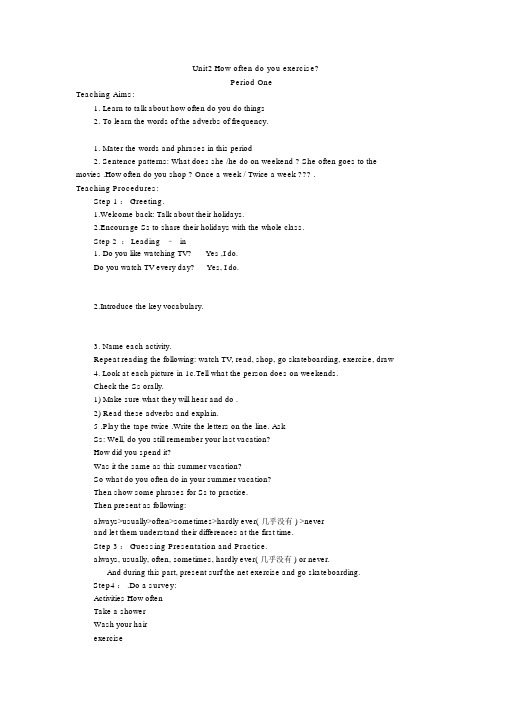
Unit2 How often do you exercise?Period OneTeaching Aims:1.Learn to talk about how often do you do things2.To learn the words of the adverbs of frequency.1.Mater the words and phrases in this period2.Sentence patterns: What does she /he do on weekend ? She often goes to the movies .How often do you shop ? Once a week / Twice a week ??? .Teaching Procedures:Step 1 : Greeting.1.Welcome back: Talk about their holidays.2.Encourage Ss to share their holidays with the whole class.Step 2: Leading–in1. Do you like watching TV?Yes ,I do.Do you watch TV every day?Yes, I do.2.Introduce the key vocabulary.3. Name each activity.Repeat reading the following: watch TV, read, shop, go skateboarding, exercise, draw4.Look at each picture in 1c.Tell what the person does on weekends.Check the Ss orally.1) Make sure what they will hear and do .2) Read these adverbs and explain.5.Play the tape twice .Write the letters on the line. AskSs: Well, do you still remember your last vacation?How did you spend it?Was it the same as this summer vacation?So what do you often do in your summer vacation?Then show some phrases for Ss to practice.Then present as following:always>usually>often>sometimes>hardly ever( 几乎没有 ) >neverand let them understand their differences at the first time.Step 3 : Guessing Presentation and Practice.always, usually, often, sometimes, hardly ever( 几乎没有 ) or never.And during this part, present surf the net exercise and go skateboarding.Step4 : .Do a survey:Activities How oftenTake a showerWash your hairexerciseClean your roomAsk and answer: How often do you take a shower?How often does he take a shower?Let Ss ask and answer in pairs, using always, usually, often, sometimes, hardly ever(几乎没有) or never.Step 5: HomeworkPeriod Two ( Section A2a-2b)Teaching Aims:1.Students can learn to talk about activities and how often to each other2.Students can listen, talk, read and write these words correctlyTeaching Difficulties:1.Words: once, twice, internet, program, full, swing2.Phrases: swing dance3.Sentence patterns: How often do you shop? I shop once a month.How often does Cheng watch TV? He watches TV ..Teaching Aids:Tape recorder; Multi-Media.Teaching Procedures:Step 1 : Greeting.Step 2 : RevisionWhat do you usually do on weekends?What does he usually do on weekends?What do they usually do on weekends?Step 3 : PresentationShow a calendar to students .T:What ’ s this ? Can you name it ?Ss : It ’ s a calendar .T : Very good . Look , this is the weekend . Saturday and Sunday are the weekends .What do you do on weekends ? First have students discuss and answer the question like this .A : What do you do on weekends ?B : I often play football.Then direct out“ how often⋯?”A : What do you usually watch TV on weekends ?B : I usually watch TV on weekends .A : How often do you watch TV ?B : I watch TV once a week/three times a month/every day( 告学生是表率的)⋯(The teacher must help students answer the question.因能够加学生言的感知,用个法频频两三句子,学生自然就会种言的表达了)Step 4 Listening and writingFirst have students listen listen to the tape once .At the same time , tell students the conversation about Cheng is talking how often he does different avtivities .First number the activities they hear (1-5) . Then have students listen again andtyr to match his activities with the number of times he does them .Step 5 PairworkHave students talk about what they do on weekends and How often do they do something each other ?Eg :A : What do you do sth on weekends ?B : I often do sth .A : How often do you do sth ?B : I do sth every .Then have some pairs to act out their conversations.Step5 Practise in writing .First help students finish“ question for underlined part”Eg: He goes to the movies three times a month .How often does he go to the movies ?Then have students finish the following evercises .1 . I often go to the movies . ( 划部分提)2 .他每周看一次。
人教版八年级英语上册unit2单元教案

2. Ability objects
Writing skill.
Listening skill.
Communicative competence
3. Moral object
Keep a diary every day in English.
II. Teaching Key Points
Step 5 2c Fill in the chart and makeconversations.
A: How often do you watch TV?
B:I watch TV every day.
A: What’s your favorite program?
B: Animal World
A: How often do you watch TV?
Step 7 Summary :Grammar Focus
1.the use of these words: always, often usually, sometimes, never, hardly ever, never,
2..How often do you watch TV?
Twice a week.
Step 6 Homework
Now homework: Remember the new words and the phrases in the class, and recite the dialogue in 1c. Prepare lessons before class.
Step 7 Blackboard Design
watch TV go to the movies read books exercise shop
人教版八年级英语上unit2sectionA1a2d教学设计教案

(二)讲授新知
1.教学内容:教师带领学生学习Section A 1a-2d的内容,讲解重点词汇和短语,如"Pensilvania", "address", "live in", "next to", "between…and…"等。
教学方法:采用实物、图片和语境创设等方法,帮助学生理解和记忆新词汇。
7.课后作业:布置与课堂内容相关的作业,巩固所学知识。
8.教学评价:通过课堂表现、作业完成情况等方面,全面评价学生的学习效果。
二、学情分析
八年级学生在经过一年的英语学习后,已经具备了一定的英语基础,对英语学习有了一定的兴趣和动机。他们对一般现在时态有初步的了解,但在实际运用中仍存在困难。此外,学生在口语表达和听力理解方面存在一定程度的不足,需要进一步培养和提高。
设计意图:培养学生的团队协作能力和创造力,提高他们的语言实践能力。
5.拓展作业:学生通过查阅资料或询问家人,了解自己所在地区的风土人情,用英语整理成一篇短文。
设计意图:拓宽学生的知识视野,提高他们的跨文化交际能力。
教师将根据学生的作业完成情况进行评价和反馈,鼓励学生认真完成作业,不断提高自己的英语水平。同时,关注学生的个体差异,对作业完成有困难的学生给予适当的指导和帮助。通过作业的布置与完成,使学生在课后能够继续巩固所学知识,提高自己的语言运用能力。
3.学生能够通过听、说、读、写的训练,提高英语语言综合运用能力,尤其是听力理解和口语表达能力。
4.学生能够根据所学知识,绘制个人或家庭住址的地图并进行介绍。
(二)过程与方法
1.通过小组合作、讨论、分享等形式,培养学生合作学习的能力。
英语 人教版 八年级上册(电子教案) Unit 2
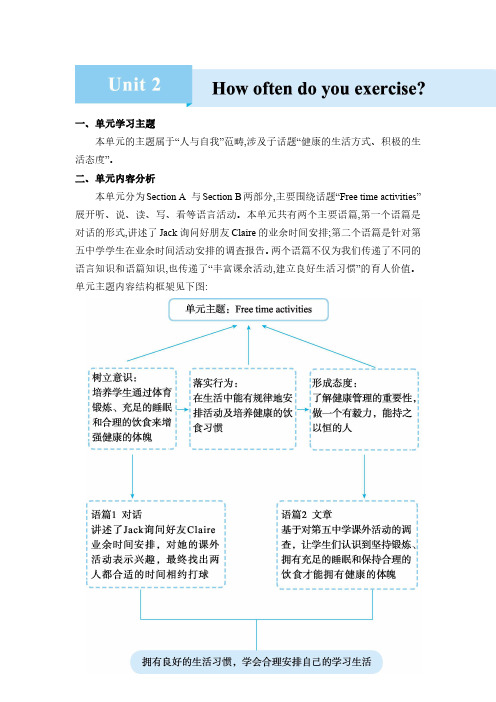
一、单元学习主题
本单元的主题属于“人与自我”范畴,涉及子话题“健康的生活方式、积极的生活态度”。
二、单元内容分析
本单元分为Section A与Section B两部分,主要围绕话题“Free time activities”展开听、说、读、写、看等语言活动。
本单元共有两个主要语篇,第一个语篇是对话的形式,讲述了Jack询问好朋友Claire的业余时间安排;第二个语篇是针对第五中学学生在业余时间活动安排的调查报告。
两个语篇不仅为我们传递了不同的语言知识和语篇知识,也传递了“丰富课余活动,建立良好生活习惯”的育人价值。
单元主题内容结构框架见下图:。
人教版英语八年级上册Unit2SectionA1a2d教学设计

6.家庭实践:鼓励学生在家中尝试用英语与家人进行餐厅点餐的模拟对话,将所学知识应用到实际生活场景中。
7.反思与总结:学生撰写一篇反思日记,回顾本节课的学习过程,总结自己在课堂上的表现,包括优点和需要改进的地方。
作业完成后,教师将对学生提交的作业进行认真批改和评价,关注学生的语言运用能力和创新思维。通过作业的布置与反馈,旨在帮助学生巩固所学知识,提高英语实际运用能力,培养跨文化交际意识。
2.视频录制:学生将编写好的对话进行角色扮演,并录制视频。在视频中,学生需要尽量模仿真实的餐厅场景,运用所学词汇和句型进行自然交流。
3.菜单制作:学生设计一份自己的餐厅菜单,包括至少5个菜品,每个菜品都有对应的英文描述和价格。要求菜单布局合理,英文表达准确。
4.课后阅读:学生阅读一篇关于餐厅点餐的英文文章,提高阅读理解能力。阅读后,完成文章后的相关问题,巩固阅读策略。
5.提高学生的阅读理解能力,能够通过阅读课文,理解餐厅菜单的基本结构,抓住关键信息。
(二)过程与方法
在本章节的教学过程中,教师将采用以下方法引导学生学习:
1.采用情景教学法,通过模拟餐厅场景,让学生在实际语境中学习词汇和句型,提高学生的语言运用能力。
2.运用任务型教学法,设计小组合作任务,让学生在完成任务的过程中,互相交流、讨论,培养团队协作能力和解决问题的能力。
3.在实际场景中,学生的语言运用能力参差不齐,需要加强口语表达和听力训练。
4.部分学生对阅读理解策略的掌握不够熟练,需要提高捕捉关键信息的能力。
因此,在教学过程中,教师应关注以下几点:
1.注重分层教学,针对不同学生的需求进行个性化指导,提高学生的语法水平。
人教版八年级英语上unit2sectionA1a2d说课稿教案

4.学习习惯:学生在学习过程中可能已经形成了自己的学习习惯,如习惯于听讲、记笔记,但可能缺乏主动探究和合作学习的能力。
(二)学习障碍
学生在学习本节课之前,可能已经掌握了一些基本的英语词汇和语法知识,如一般现在时态的运用。然而,以下学习障碍可能存在:
3.对全班学生的学习情况进行总结,指出普遍存在的问题,并提供改进的方法。
4.鼓励学生之间相互评价,促进他们互相学习和进步。
(五)作业布置
课后作业的布置情况如下:
1.听力作业:让学生回家后听英语原声材料,提高听力理解能力。
2.口语作业:要求学生与家人或朋友用英语进行对话,练习本节课所学的句型和词汇。
3.书面作业:布置一篇关于学校生活的英语作文,让学生将所学知识应用到写作中。
3.情境教学法:通过创设情境,让学生在特定的语言环境中学习,提高语言的输入和输出效果。这种方法有助于学生将所学知识应用到实际生活中。
选择这些方法的理论依据是,它们能够充分调动学生的学习积极性,促进学生的主动参与和合作,同时符合语言学习的交际性和实践性原则。
(二)媒体资源
在本节课中,我将使用以下教具和多媒体资源:
(2)培养学生合作学习、自主学习的能力,提高学生的课堂参与度;
(3)引导学生运用所学知识解决生活中的实际问题。
3.情感态度与价值观目标:
(1)培养学生热爱学校生活,积极参与学校活动的情感态度;
(2)通过学习,让学生认识到英语在实际生活中的重要性,增强学习英语的兴趣和信心;
(3)培养学生团结协作、互相帮助的精神。
2.利用情景教学法,创造一个真实的语言环境,让学生在实际语境中学习并运用新知识。
人教版英语八年级上册Unit 2 Section A (2a-2d)教案设计

教学设计How often do you exercise?(Section A2a---2d)一、设计理念《新英语课程标准》指出:教师应该创造性地设计贴近学生实际的教学活动,吸引和组织学生积极参与,使之能够获取信息、处理信息及使用信息,最后能用英语与他人交流。
因此,这节课的设计理念为“创设真实情景、生动优化英语”,让学生置身于真实的场景中、在浓厚的氛围中感知,在交流与合作中看到成就,体验成功。
二、教材分析本单元是“Go for it”八年级上册中Unit2 “How often do you exercise?”这单元主要内容是表达“频率”。
Section A通过听力、对话练习、小调查等方式帮助学生掌握如何询问及表达有关频率. Section B通过听力、阅读、做调查等方式,帮助学生掌握如何用频度副词综合表达信息;Self Check 部分通过填空帮助学生复习所学词汇,通过开放式的写作帮助学生巩固对频度副词的掌握。
三、学时分配本单元共分为4节第一节Section A1a—1c第二节Step 2 Section A2a—2d第三节Step 3 Section B 1a—1c第四节Step 4 Section B2a—4本课时选自其中Step 2 Section A2a---2d四、教学目标1.知识目标(1)掌握询问做事情频率的重点句型:How often do you do …?(2)掌握询问周末活动的句型:What do you usually do on weekends?(3)掌握表示频率的副词,短语副词:always, usually, often, sometimes, never。
短语:hardly ever,once/twice/three times a week/month/year.every day/week/month/year(4)掌握一般现在时的用法2.能力目标能够综合各种信息,准确地表述频率。
人教版八年级上册英语第二单元教案

Unit 2 What’s the matter?课前准备:1.学生通过上网,查资料寻找身体各部位英文名称,各种常见疾病表达法课上任务:step 1 Brainstormstep 2 presentationstep 3 tasksstep 4 practicestep 5 homeworkstep 6 课后实践本节课总目标描述本节课的知识目标是学习用英语询问健康状况并提出建议。
通过听、说、做游戏、做事情, 让学生掌握本节课的基本句型:What’s the matter? I have a headache. You should drink some tea. That sounds a good idea. I have sore back. That’s too bad. I hope you feel better soon. 本节课的总体设计体现了新课程标准中的从学生的学习兴趣、生活体验和认知水平出发,倡导体验、实践、参与、合作与交流的学习方式和任务型的教学途径的教学理念。
为了激发学生学习兴趣,本节课采用了多媒体和实物投影的教学辅助手段,学生活动中设计了两组游戏,激发学生积极主动地参与课堂学习活动;借助本班急救小药箱需要专人负责,招募小医生,创设一种真实的、贴近学生生活实际的教学情境,培养学生以英语语言作为第一反映的、在体验中自然习得用英语购物的常见句型,从而提高学生语言综合运用能力、自主学习和发散思维的能力。
课堂组织形式以小组活动为主,增加每个学生课堂参与的机会和发挥个性特长的机会,在参与中培养学生的合作精神、团体精神以及相互学习、资源共享的意识。
在活动中引导学生不断整合已经学过的知识,进一步提高语言的运用能力,即培养学生的记忆、观察、思维、想象能力和创新精神。
本堂课关注对学生的评价,并以评价促进学生发展。
本节课注重对学生的形成性评价。
以激励评价为主,侧重于学生参与意识和能力、探究意识和能力、合作意识和能力、整合知识的意识和能力,使学生获得成功的喜悦,增强自主学习的自信心;在评价中关注学生的情感、学习策略的调控。
人教版英语八年级上册Unit2SectionA2a-2d教案与反思
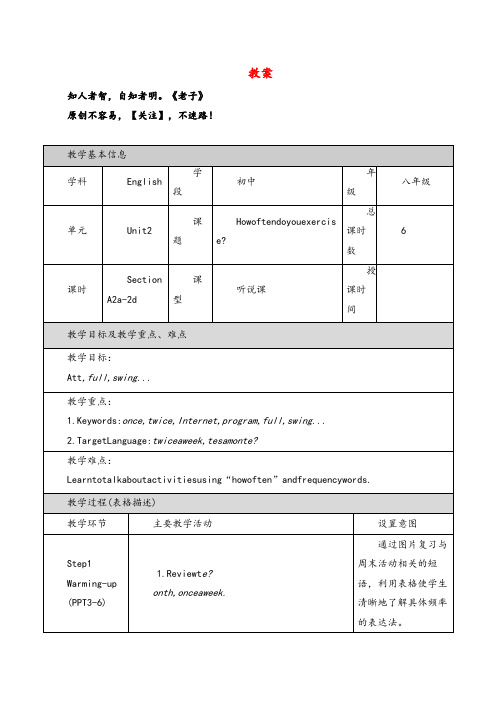
通过词形填空、句型转换和完成句子等式练习所学的重点。设计这些练习题是为了让学生运用所学的语言知识点。
Step9
中考链接
(PPT32)
Thisexerciseisabouthowoften.
此处将中考题与本节课所学的howoften句型进行链接,使学生充分理解howoften的重要性。
2.Readtheverbphrasesandfrequencywords.
利用日历PieChart分布图,使学生熟练频率副词的表达方式。
为听力提供素材。
Step3
Listening
(PPT9-11)
Workon2a.
1.PlaythetapeforSstolistento2a.
Listen.ChengTaoistalkingabouthowoftenhedoestheseactivities.Numbert.
Step5
Role-play
(PPT15-18)
Workon2d.
1.AskSstoreadtheconversationonheirownthenrole-playitwithpartners.
2.Callsomepairstopresentinclass.
3.Afterrole-play,fillintheblanksandtrytoretellthetext.
教案
知人者智,自知者明。《老子》
原创不容易,【关注】,不迷路!
教学基本信息
学科
English
学段
初中
年级
八年级
单元
Unit2
课题
Howoftendoyouexercise?
人教版八年级上册英语教案Unit 2 Section A 1a-1c带教学反思
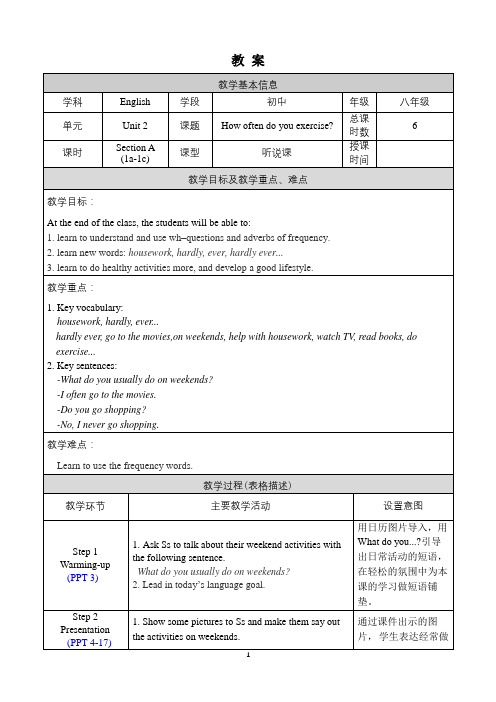
3. Learn the frequency adverbs.
4. Read the frequency adverbs.
Work on 1a.
1. Ask Ss to look at the picture and make a list of the weekend activities.
教学环节
主要教学活动
设置意图
Step 1
Warming-up
(PPT 3)
1.Ask Ss to talk about their weekend activities with the following sentence.
What doyouusuallydo onweekends?
2. Lead in today’s language goal.
Listening
(PPT 18-20)
1. Play the tape of 1b for Ss to listen and write the activities next to the correct frequency words.
2. Make Ss listen again and check answers.
用日历图片导入,用What do you...?引导出日常活动的短语,在轻松的氛围中为本课的学习做短语铺垫。
Step 2
Presentation
(PPT 4-17)
1. Show some pictures to Ss and make them say out the activities on weekends.
Section A (1a-1c)
always
人教版八年级英语上册第二单元英文教案

人教版八年级英语上册第二单元英文教案Teaching PlanUnit2 what’s the matter? (Period 1)Grade Level: Junior School 2Lesson Type: Integrated lessonDuration: 45 mObjectives: 1) Talk about your health;give advice.2) By communicating with each other, Ss can learn to care about others, and can give proper advice to others. In this way, a student can get along well with others.3) By learning, Ss can know how to express their ideals and how to ask something in UK or USA.Key point: Learn some words about body parts and the expression of sickness and can give proper advice.Difficult point: The expression of sickness and give adviceTeaching Method: Suggestopedia and Communicative language teachingTeaching Aid: PPTTeaching Procedures: Warming-up Step 1: Listening to a song including some words about body parts. Ask Ss which parts are they heard. (2 min) Step2: A picture on PPT showing Ss the body parts. Then Ss read these words following T. 5 minutes are allowed for Ss to remember these words as soon as possible. (6 min) Step3: Game. Divide Ss into two groups, Team1 and Team2. Pick one student in T1 and pick one in T2. First, one student point a body part, another must speak and pronounce it quickly. If it is true, this group gets one scores; if not, it hasn’t scores. Which group gets more scores, it will be the winner. The group which is loser will require singing an English song together. (8 min) Step4:Learn some new words about sickness. Compare some words on PPT, such as head--- headache, back--- sore back, so Ss can remember these quickly. (3 min) Step5: Look at the pictures in Page 7. T explains the meaning of the conversation.Then show some examples of this kind of sentence. Ss are asked to read this conversation, T corrects their pronunciation. (5 min) Step6: Listening Activities. Learn the phrases in 2a, then listen to the tape twice and finish the task in 2a and 2b. (10 min) Step7: Communicative Activities. Pair works. According to the pictures showed on PPT, Ss make a conversation. Ss should give others advice by discussing with partner. For example, “I have a sore throat”“You should drink some hot tea with honey”. (8 min) Wrapping-up Step8: Revision. Grammar Focus (2 min) Homework: 1) Review 3a 2) Practice on Learning Plan (1 min) Blackboard Design:Unit2 what’s the matter? (Period 1)What’s the matter? Team1 Team2I have a toothache.You should see a dentist.Learning PlanUnit2 W hat’s the matter? (Period 1)Learning Goals: 1) Some new words about body parts and sickness; phrases about giving advice.2) Learning how to ask someone about his sickness and give advice.Key Point: Express someone’s sickness and give advice.Pre-lesson:1) Translate words.1.胳膊_______2.后背________3.耳朵_______4.眼睛_______5.脚________6.手_____7.头8.腿_____ 9.嘴________10.脖子11.鼻子12 .胃13.牙齿14.喉咙15.膝盖2) Translate phrases.1.感冒__________________2.头疼_______________3.牙疼________________4.胃疼5. sore throat6. have a fever.7. have a stomachache 8.see a dentist9. hot tea with honey 10.drink lots of water While-lesson1.What’s the matter/problem with you? What’s wrong?2.The different usage of sore、-ache. toothache headache stomachachesore throat sore back sore3.The usage of “should”Should + verb 应该……E.g. You should sit down and rest.After-lesson.Practice1. Fill in the blanks with the appropriate form.1)He has two strong (arm).2)We look at the blackboard with our (eye).3) We walk with our (foot).4) The baby has four (tooth) now.5) I have a bad (head), so I can’t go to school.2. Finish the sentences.1) What’s the matter with you? ( 改为同义句)with you?2)There is something wrong with his back(对划线部分提问)with his back?3) I have a sore throat. (提问划线部分)you?4) John is feeling well. (提问划线部分)John ?5) She had a cold yesterday. (改为否定句)She yesterday.3. Choose the right answers.1). ---Do you have a headache?---_________ .A. Yes, I haveB. No, I have notC. Yes, I do2). David ______ a stomachache. So he ______ eat anything for twenty-four hours.A. has, shouldB. has, shouldn’tC. have, shouldn’t3) Everyone ______ sometimes.A. gets tiredB. are tiredC. get tired4) Judy has a sore throat. What should she do?A. She should go to bedB. She should see a dentist.C. She should drink hot tea with honey.Teaching AnalysisIn this lesson, we begin to learn Unit 2 “What’s the matter?” In this unit, we will learn to ask someone’s sickness and give advice. We will learn “What’s the matter?”and “What should … do?” This topic is related to the student’s life, so it is easy to lead students to communicate with classmates about the sickness and advice. By communicating, I hope that can improve the relationship between students and teacher. The key points of this lesson are asking about sickness and give advice. The sentence is “What’s the matter?”“I have a headache”.As students in Junior school Two, they have some basic knowledge of English, but most of them are not much too interesting to learn English. So in English learning, they more like game and activities, so game and activities are necessary in class to stimulate their motivation. In this way, they will be more interested in learning English, and they can feel learning English more easily.As to teaching method, I am going to use two methods: Suggestopedia and Communicative language teaching. First this is Suggestopedia, in the beginning of this class; I design to let students listening to a song about body parts. So this not only let students learn some new words, but also cultivate students’interesting. Another method is Communicative language teaching. Teacher will design some communicative activities to let students talk with each other. Just as I have mentioned above, this topic is related to students’ life. So by giving advice, they can learn to care about others and they canget along well with each other by talk with each other.As to the teaching procedures, first I design listen to a song to lead-in this class, students can learn knowledge and be more interesting to this class. Second, learn some new words about body parts on PPT. Third, there is a game to memorize the words, this can train students’awareness of competition and develop an active atmosphere. Forth, learn some new words about sickness and the main sentence “what’s the matter”. Fifth, some phrases about giving advice. Sixth, listening activity, listen to the tape twice. By listening, students can learn how to ask others about their health and give advice. Next, Communicative activity. In this part, students willcommunicate with each other according to the pictures showed on the PPT. In the end of this class, revision will be the wrapping-up. So teacher and student summarize the main points together to let students memorize deeply.。
人教版八年级英语上册-Unit2-教案
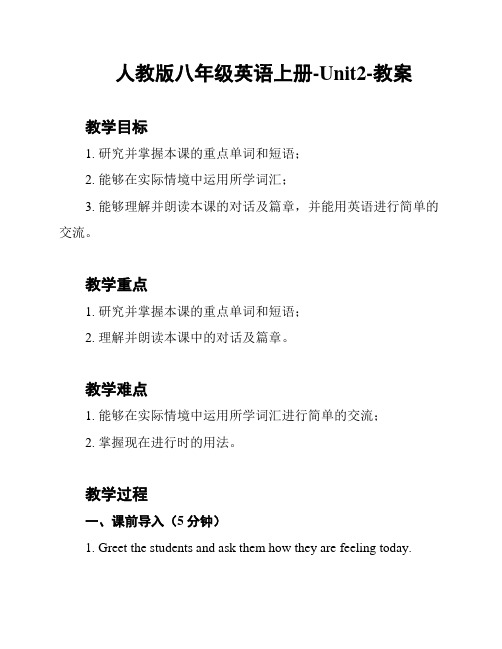
人教版八年级英语上册-Unit2-教案教学目标1. 研究并掌握本课的重点单词和短语;2. 能够在实际情境中运用所学词汇;3. 能够理解并朗读本课的对话及篇章,并能用英语进行简单的交流。
教学重点1. 研究并掌握本课的重点单词和短语;2. 理解并朗读本课中的对话及篇章。
教学难点1. 能够在实际情境中运用所学词汇进行简单的交流;2. 掌握现在进行时的用法。
教学过程一、课前导入(5分钟)1. Greet the students and ask them how they are feeling today.2. Show some pictures on the screen and try to ask them what the pictures are about.二、自主研究(35分钟)1. 学生们自主研究课文,并做好笔记,记录不熟悉的内容和需要了解的疑点。
2. 学生们可以在自主研究的过程中互相讨论并互相帮助。
三、交流展示(15分钟)1. 当做完自主研究后,老师开始组织学生展示他们的研究成果,展示方式并不限定,有朗读、问答等,总之要把研究到的知识用出来,让知识得到巩固。
2. 学生们可以相互交换信息或者反馈,梳理研究内容,发现问题。
四、课堂总结(5分钟)1. 了解本节课的教学内容,培养学生研究语言的兴趣。
2. 学生们要及时复和总结,才能让这些知识真正掌握。
教学板书设计1. 本课的重点单词和短语。
2. Was he doing exercise? Yes, he was.课后作业1. 完成本课课后的题。
2. 总结课上学到的内容。
- 1、下载文档前请自行甄别文档内容的完整性,平台不提供额外的编辑、内容补充、找答案等附加服务。
- 2、"仅部分预览"的文档,不可在线预览部分如存在完整性等问题,可反馈申请退款(可完整预览的文档不适用该条件!)。
- 3、如文档侵犯您的权益,请联系客服反馈,我们会尽快为您处理(人工客服工作时间:9:00-18:30)。
Work on 2b:
1. Tell Ss they will hear the recording again. This time, listen and match the activities in2awith how often Cheng Tao does them.
Ⅱ. Presentation
(1)教师问:“What do you usually do on weekends ? ” (并且板书)让学生根据自己的实际回答I usually …… on weekends.
(2)教师出示动词卡片watch TV,read books,exercise,swimplayfootball、go shopping、go to movies让学生回答。
教学重点:1)—How often do you /does he(she)….?—He usually…
2)频度副词的用法:always; usually ; often ; sometimes; hardly ever; never
教学难点:1)第三人称单数谓语动词在此核心句型中的运用。
2)能够谈论课余时间的各项活动,以及初步认识和使用频率副词。
B:一般现在时态
在一般现在时的一般疑问句中,当主语为第三人称复数或单数时,需要句子前加助动词Do或Does。
他们通常在周未锻炼吗?
___ they often ________ on weekends?
她一周上网二次吗?
_____ she _____ the Internet twicea week?
2)能了解以下语法:
频度副词及一般现在时简单谈论周末活动情况。
2.情感态度价值观目标:
通过本单元的学习,养成健康的饮食习惯,保证充足的睡眠时间,进行合理的运动锻炼,以保持健康的体魄。培养学生的逻辑表述能力,激发学生的积极思维,并使学生互相了解,增进友谊,加强人际交往,以形成良好的人际关系。
教学重点:1)对6个频度副词细微差异的理解及使用。
学校
三中
学科年级
八年英语
课型
新授课
课时
1
主备人
张晓林
检查人
教研组长
设计时间
2014.8
修改时间
2014.9
课题:Unit 2 How often do you exercise?Section A1(1a-2d)
教学目标:1.语言知识目标:
1)能掌握以下单词:housework, hardly, ever, hardly ever, once, twice, Internet, program, full, swing, swing dance, maybe, least, at least
Ⅴ. Group work
1. Let Ss work in groups of six or eight.
S1: I watch TV every day.
T: What’s your favorite program?
S1: Animal world.
2. Let one student read the activities in the chart. Tell them these new words:
4. Play the tape for the second time for the Ss to check the answers.
Ⅴ. Pair work
1. Act out the conversation with a student.
2. Let Ss talk about the pictures in1ain pairs.
教
学
预
设
过
程
Ⅰ. Warming- up and revision
1. Ask and answer some oral questions on how often exercise.
2. Check the homework and have a dictation of some new words.
Homework:
Act out the conversation after class.
教
学
反
思
学校
三中
学科年级
八年英语
课型
新授课
课时
1
主备人
张晓林
检查人
王培义
设计时间
2014.8
修改时间
2014.9
课题:Unit 2 How often do you exercise?Section A(Grammar Focus-3c)
3.学生们完成填空试题后,可以打开课本检查答案,对错误的句子,单独进行强化记忆。
Ⅲ. Try to Find
1. Tell Ss try to find the answers.
A:how often意为“_____”,是用于提问表示_____的特殊疑问词组。其答语应为表示_____的副词或副词词组。句子的时态一般是_____,也可以是一般过去时。
教学目标:1.语言知识目标:
1)复习运用频率词汇及询问活动频率。
2)一般现在时态的熟练运用。
2.情感态度价值观目标:
通过本单元的学习,养成健康的饮食习惯,保证充足的睡眠时间,进行合理的运动锻炼,以保持健康的体魄。培养学生的逻辑表述能力,激发学生的积极思维,并使学生互相了解,增进友谊,加强人际交往,以形成良好的人际关系。
2)弄清一般现在时在不同人称下动词形式及提问的变化。
教学难点:1)第三人称单数谓语动词在此核心句型中的运用。
2)谈论课余时间的各项活动,以及初步认识和使用频率副词。
课前准备:PPT andLearning Guide
板
书
设
计
Unit 2Section A1(1a-2d)
—What does he do on weekends?
2. Tell Ss to listen and write the letters from the picture above on the line below.
3. Play the tape for the first time. Ss listen and fill in the blanks.
favorite website (最喜欢的网站);favorite sport (最喜欢的运动)
3. Ss work with their partners. Then ask some pairs to act out their conversations.
Ⅷ. Role-play
1. Read the conversation by themselves, thenmatch the activity with the right time.
Ⅱ. Grammar Focus.
1.学生阅读Grammar Focus中的句子,然后做填空练习。
1)你通常在周未做什么?
______ ____ you _______ do on weekends?
2)我总是去运动。I _______ _______.
3)他们总是在周未做什么事情?
______ _____ they________ on weekends?
—He usually watches TV.
—How often do you watch TV?
—I watch TV every day.
—Does he go shopping?
—No, he never go shopping.
教
学
预
设
过
程
Ⅰ. Lead in
Talk about yourlast weekend’s activities.
7)我可能一个月去看一次。
I go to movies ______ _______ a ________.
8)他多久看一次电视?
______ _______ does he watch TV
9)他几乎不看电视。
He ________ _______ watches TV.
10)他去购物吗?______ ___ go shopping?
2. Ss listen and math the activities with the phrases.
3. Check the answers.
Ⅶ. Pair work
1. Ask one student how often he/she watch TV as a model.
T: Hi, S1. How often do you watch TV?
2. Let some Ss read out their activities. Let other Ss add more activities.
Ⅳ. Listening
1. Let a student read the words aloud. Make sure all the Ss know the meaning of the words.
能掌握以下句型:
① —What does he do on weekends?—He usually watches TV.
② —How often do you watch TV?—I watch TV every day.
③ —Does he go shopping?—No, he never go shopping.
Ⅳ. Practice
1. Tell Ss to make questions.
